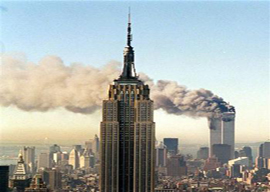
September 08, 2011

True, we commemorate those who died in our nation’s wars; but a war is a collective national enterprise for which national commemoration is appropriate. And we no longer hold official commemorations of particular wars, as it would raise touchy issues: in relation to the Civil War, for instance, or the Vietnam War. Still less do we commemorate single battles or attacks such as Pearl Harbor. Still less yet do we commemorate terrorist acts such as the 1920 Wall Street bombing. So why are we commemorating 9/11?
In common with, I think, most sane Americans—a category from which I’d exclude those in thrall to conspiracy theories—I recall 9/11 with two principal emotions: anger and shame.
The anger is a natural response to the fact that those attacks were a gross insult to my country. Insults make one angry. My anger was compounded by the thought of thousands of harmless middle-class New York office workers, the kind of people I have spent much of my working life among, suffering horrible deaths at savages’ hands.
The shame arises from thinking of the stupidities in which Americans had collectively indulged and that allowed the 9/11 terrorists to do what they did. As the 9/11 Commission report says, after cautioning against hindsight: “We believe the 9/11 attacks revealed four kinds of failures: in imagination, policy, capabilities, and management.”
Should we commemorate an insult? Should we commemorate our failures?
A better approach would be first to avenge the insult, then to pass over anniversaries of it in grim silence. The avenging has been sufficiently accomplished by our relentless killing of al-Qaeda personnel—a senior one just last month—and our trashing of Afghanistan, which had been hospitable to the terrorists.
Some of our failures have been addressed. The “security theater” at airport check-in contains a high proportion of make-believe, but it is much harder now to take over the cockpit of a plane in flight than it was ten years ago.
In other respects we are as stupid now as we were then. Following 9/11 a sensible nation would have stopped, or severely restricted, Muslim immigration. We took the opposite approach. Two of every five foreign-born Muslims in the USA today arrived in the last ten years. Tens of thousands of them hold extremist opinions.
In short, there’s nothing good to commemorate.
The most I’ll allow, at a stretch, is that if the USA were a nation with an established religion, a modest church service might be appropriate to administer some tribal bonding and to remind us not to hate our enemies too indiscriminately. Religion is good at that kind of thing.
Unfortunately the Constitution excludes any such possibility. We could only have a religious commemoration if we brought in all religions. That would mean Muslims, too. They would certainly clamor to be included, arguing that Muslims other than the hijackers also died in the attacks (which is certainly true, though the number is disputed, with estimates from 20-something to 60-something).
If there were going to be imams at the service, though, some number of the 9/11 families would boycott the event, leading to a rancorous row. Mayor Michael Bloomberg’s has excluded all clergy from Sunday’s ceremony.
That leaves us with no rationale for public commemoration that I can see. My own answer to the opening question is the one I gave nine years ago, at the time of the one-year anniversary: defiant normality. I recommend it to the nation at large.